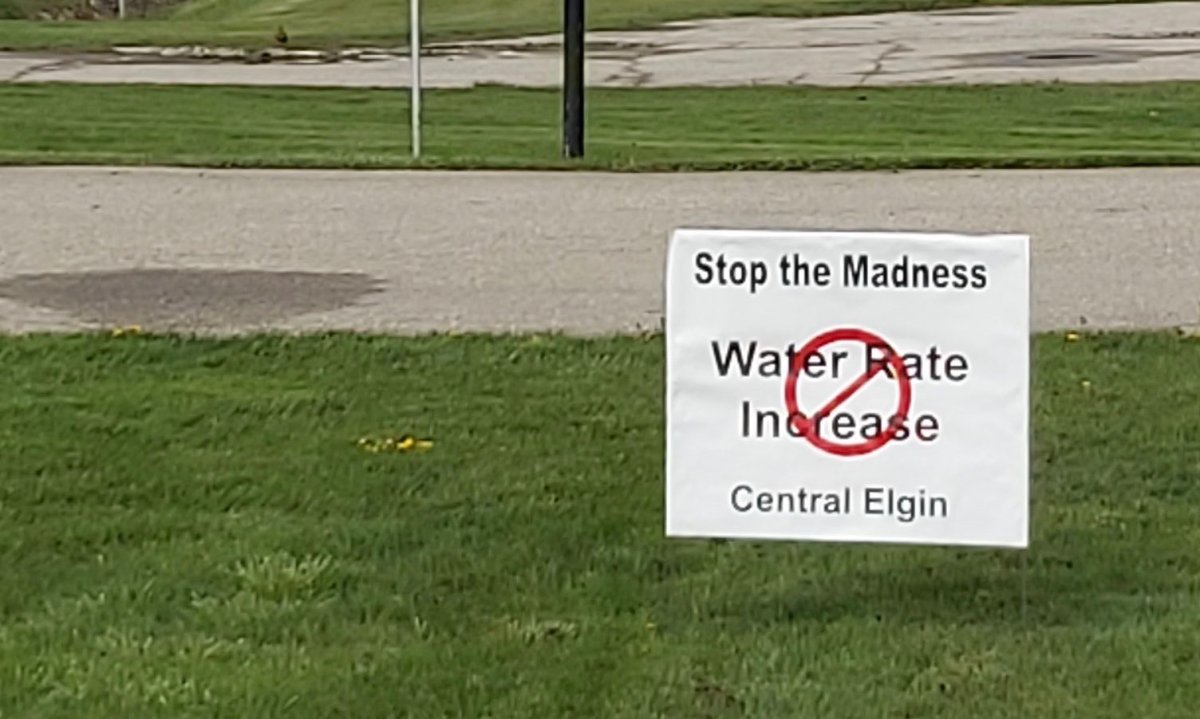Residents in Central Elgin are taking a stand against the increasingly high water prices in the area.

Carol Lucia and her husband moved to Port Stanley just over three years ago from Halton to be closer to her father and daughter after retiring.
Before the move, she estimates paying around $50 per month for her water bill compared to the $120-$160 she pays per month now.
Her daughter, who has a family of four, pays around $500 a month, and her father pays $153.
“We feel like we are being gouged, a lot for residents here have spoken up,” Lucia said.
According to Lucia, people she has heard from have anxiety about how many times they flush the toilet or water their grass and garden.
She and over 900 other residents are a part of a Facebook group called “Accountability For Central Elgin – Water” to raise awareness about the issue.
In 1998, the Municipality of Central Elgin was formed by the amalgamation of the Villages of Belmont and Port Stanley and the Township of Yarmouth.
When the municipality was formed, Mayor Sally Martyn said they inherited outdated water systems and wastewater infrastructure from several areas that all needed to be updated.
Some of the changes to the water system included a new water tower, water supply system, and upgraded sewage treatment in Belmont, 35 km of replacement water main in Belmont and Port Stanley, and upgraded sewage treatment in Port Stanley.
“Because there were no reserves, we had to borrow money from Infrastructure Ontario to pay for it,” said Central Elgin Mayor Sally Martyn.
“We have to make sure we provide safe, clean drinking water for everyone.”
The cost of making all of these updates comes in at a steep price — just over $40.6 million, $10.8 million of which is for water and $29.8 million for wastewater.
“Water should be affordable to everyone, especially when you compare it to the other municipalities around us, we are more than double a lot of them,” Lucia said.
Martyn said it’s unfair for residents to compare the costs they pay to larger communities. She said unlike more densely populated areas with apartment buildings that only require one line for multiple homes, in areas like Port Stanley, all the properties are single homes that each need their own hookup. Martyn said the single home coupled with a less densely populated area means everyone ends up paying more for the service.
This year, the price of water went up 23 per cent, an increase Martyn said was due to not raising the price in 2020 because of the pandemic.
In 2021, water charges in Central Elgin came with a monthly base charge of $27.38 and $3.33 per cubic metre of water use. Wastewater costs a $30.88 base charge and $2.85 per cubic metre.

By 2029, the base rate for water is expected to more than double, to $61.81, with the consumption charge dropping down to $2.01 per cubic metre and the base wastewater rate expected to go up to $45.52 with the consumption charge staying the same.
“We feel that is way too much for such a small base of customers, and all that money has to be paid back and all the burden is put onto the customers,” said Port Stanley resident Doug Fiveash.
Fiveash has lived in Port Stanley his whole life and said that although the price for water has been steadily increasing since the amalgamation, he really started to notice a difference in 2017.
“In 2016, we were around $800 a year for both (water and wastewater), then we jumped up to $972 in 2017, and then it’s gone up from there. Today it’s $1,600,” he said.
“Everyone is starting to notice the increases, it’s gone beyond reasonable. We pay more for water and sewer than we do our hydro and I don’t think anyone thinks that’s acceptable.”
Fiveash, like other residents, questions if the costs of repaying the debt are something that can be passed on to the federal or provincial governments, or if there are options for extending repayment.
Looking at their options, though, Martyn said the responsibility on replaying the loan falls to the municipality, and when they accepted the money, she had to commit to a date the loan would be repaid, so extending the loan is not an option.
“The water that we are collecting for will be out of deficit in two years, then we will be working towards setting aside money in reserves for when we need to replace the infrastructure again. So our first debt will be paid off in 2025 as far as borrowing and all of it will be paid off by 2035,” Martyn said.
For wastewater, Martyn said each year they pay $2 million to pay off the wastewater debt, $1.4 million of which comes from development charges and $670,000 is what is collected from users.
Martyn said the water department is in a “deficit position,” meaning they had to borrow money from other areas in the budget, whereas wastewater is just a matter of paying off the debt.
“They’re not cheap. I am sorry we have to do this, but because of the legislation, we are mandated to charge enough to provide them with clean safe drinking water, and we had to incur debt to do that,” Martyn said.








Comments